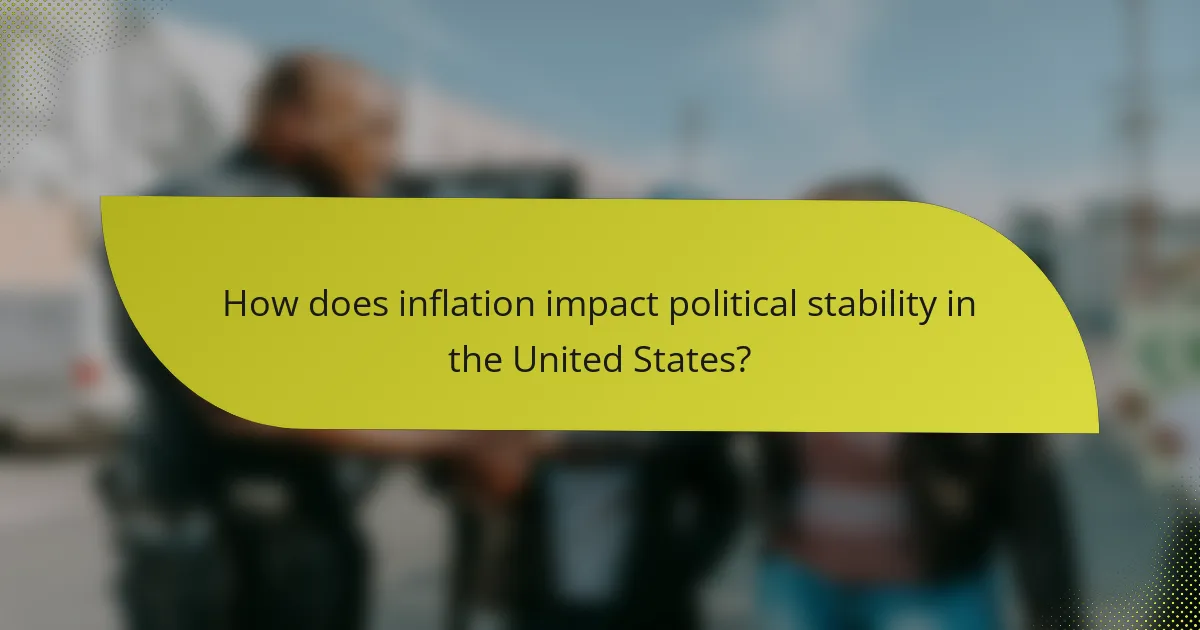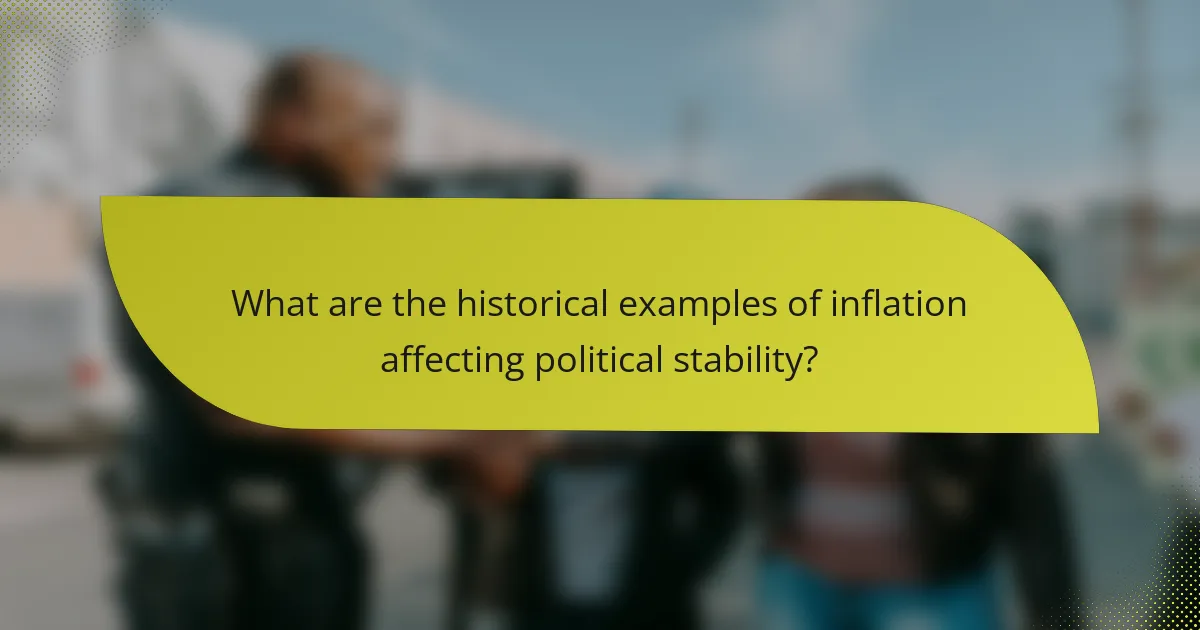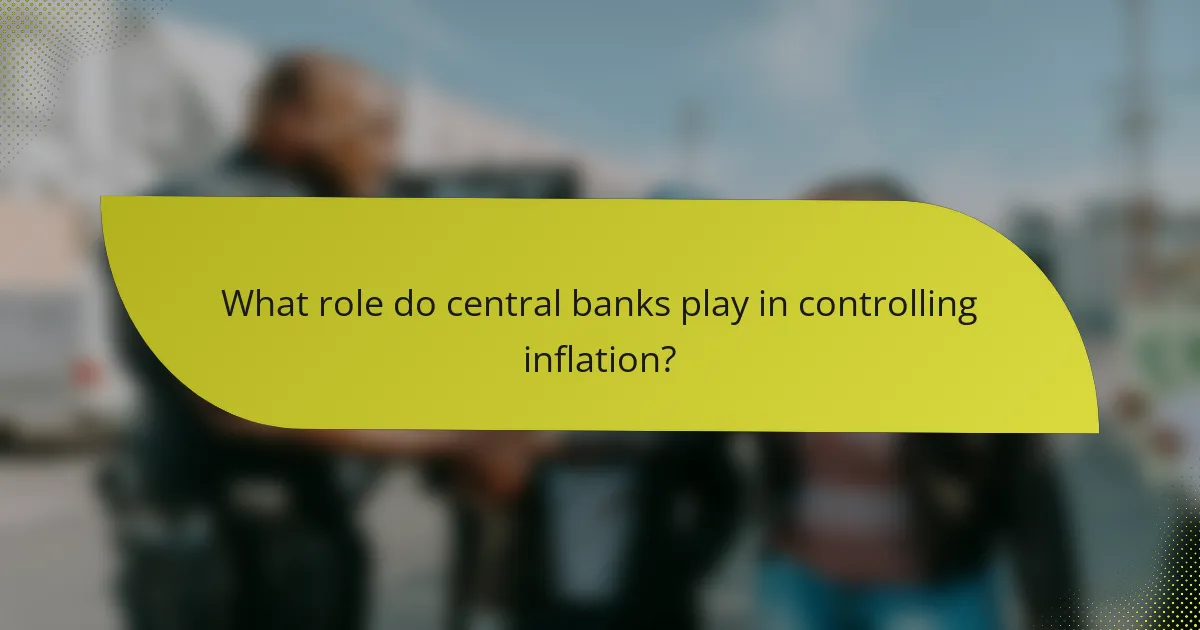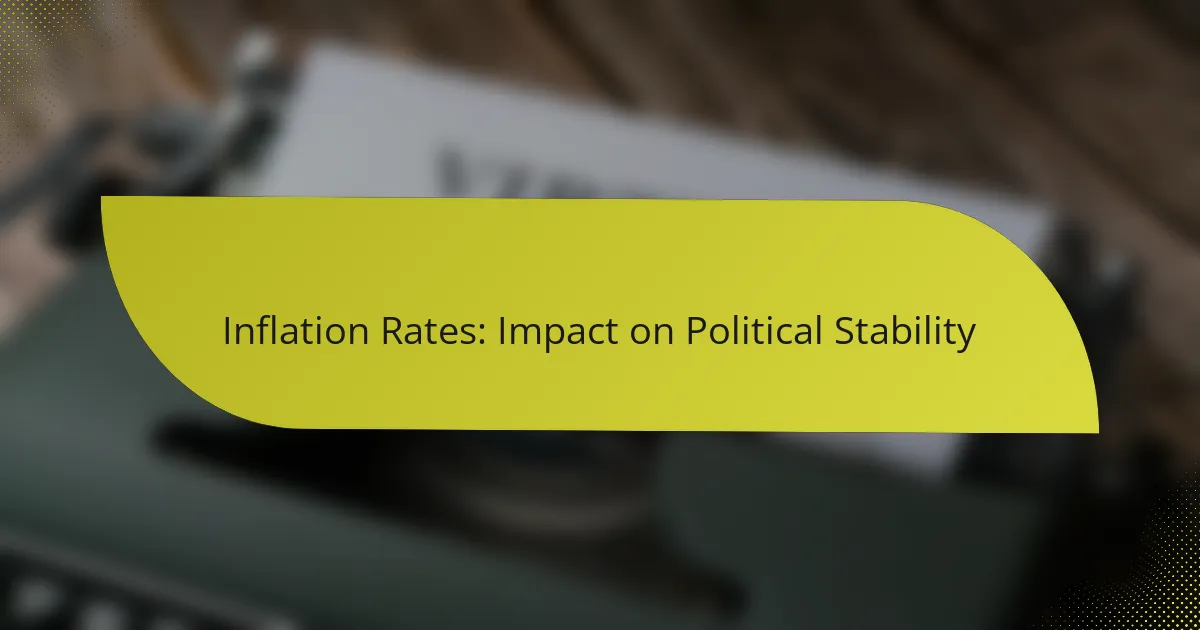Inflation plays a crucial role in shaping political stability, particularly in the United States, where rising prices can exacerbate economic inequalities and fuel public discontent. As citizens experience diminished purchasing power, the potential for social unrest and political upheaval increases, highlighting the intricate link between economic conditions and governance. Historical precedents illustrate that unchecked inflation can lead to significant political shifts, prompting governments to adopt various strategies to mitigate its effects and maintain stability.

How does inflation impact political stability in the United States?
Inflation significantly affects political stability in the United States by exacerbating economic disparities and increasing public dissatisfaction. As prices rise, the purchasing power of citizens diminishes, leading to heightened tensions and potential instability within the political landscape.
Increased economic inequality
Inflation tends to widen the gap between the wealthy and the poor. Those with fixed incomes, such as retirees, struggle to maintain their standard of living as prices for essential goods and services rise. Conversely, individuals with assets that appreciate with inflation may benefit, leading to a growing divide in wealth distribution.
As economic inequality increases, marginalized groups may feel neglected by the political system, fostering resentment and a sense of disenfranchisement. This can undermine trust in government institutions and lead to calls for reform or change.
Higher public discontent
As inflation erodes purchasing power, public discontent often rises. Citizens may express frustration over rising costs of living, particularly for necessities like food, housing, and healthcare. This dissatisfaction can manifest in protests, decreased voter turnout, or support for radical political movements.
Politicians may face pressure to address these issues through policy changes, such as wage increases or price controls. However, these measures can lead to further economic complications, creating a cycle of discontent and instability.
Potential for civil unrest
High inflation can lead to civil unrest as citizens react to economic hardships. When basic needs become unaffordable, frustration can boil over into protests or riots, challenging the authority of the government. Historical examples, such as the unrest during the 1970s in the U.S., illustrate how inflation can trigger significant social upheaval.
To mitigate the risk of unrest, governments may need to implement effective communication strategies and economic relief measures. Failing to address the root causes of inflation-related discontent can lead to a breakdown in social order and further political instability.

What are the historical examples of inflation affecting political stability?
Historical examples show that inflation can significantly destabilize political systems, often leading to social unrest and changes in governance. High inflation rates erode purchasing power, create economic uncertainty, and can fuel dissatisfaction with political leaders.
Germany’s Weimar Republic
The Weimar Republic experienced hyperinflation in the early 1920s, primarily due to the economic burdens imposed by World War I reparations. Prices skyrocketed, with the cost of basic goods increasing dramatically, leading to widespread poverty and discontent among the populace.
This economic turmoil contributed to the rise of extremist political movements, including the Nazis, who capitalized on public frustration. The instability ultimately culminated in the collapse of the Weimar Republic and the establishment of a totalitarian regime.
Zimbabwe’s hyperinflation crisis
Zimbabwe faced one of the worst cases of hyperinflation in history during the late 2000s, with inflation rates reaching astronomical levels. The government printed excessive amounts of currency to finance its budget deficits, which led to a complete loss of confidence in the Zimbabwean dollar.
This hyperinflation resulted in severe economic decline, widespread unemployment, and social unrest. Political instability ensued, with protests against the ruling party and calls for reform, ultimately leading to the abandonment of the local currency in favor of foreign currencies like the US dollar.

What measures can governments take to mitigate inflation’s effects?
Governments can implement various strategies to reduce the adverse impacts of inflation, focusing on monetary policy adjustments, interest rate changes, and fiscal stimulus enhancements. These measures aim to stabilize the economy, control price levels, and maintain political stability.
Implementing monetary policy adjustments
Monetary policy adjustments involve changing the money supply and interest rates to influence economic activity. Central banks, such as the Federal Reserve in the U.S. or the European Central Bank in the Eurozone, can use tools like open market operations and reserve requirements to manage inflation.
For example, if inflation is rising, a central bank may decide to reduce the money supply, which can help to cool down spending and investment. However, these adjustments must be carefully timed, as overly aggressive measures can lead to economic slowdown or recession.
Increasing interest rates
Increasing interest rates is a common tactic used to combat inflation. When rates rise, borrowing costs increase, which tends to reduce consumer spending and business investment. This decrease in demand can help to lower inflationary pressures.
Typically, central banks may raise rates in increments of 0.25% to 0.75%, depending on the inflation rate and economic conditions. However, policymakers must balance the need to control inflation with the risk of stifling economic growth.
Enhancing fiscal stimulus
Enhancing fiscal stimulus involves government spending and tax policies designed to boost economic activity. While this may seem counterintuitive during inflationary periods, targeted fiscal measures can help support vulnerable populations and stimulate sectors that drive growth.
For instance, governments may increase spending on infrastructure projects or provide direct financial assistance to low-income households. However, it is crucial to ensure that such measures do not exacerbate inflation, necessitating careful planning and execution.

How do inflation rates influence voter behavior?
Inflation rates significantly impact voter behavior by shaping public perceptions of economic stability and government performance. When inflation rises, voters often seek alternatives to the incumbent parties, reflecting their dissatisfaction with economic conditions.
Shift towards populist candidates
As inflation increases, voters may gravitate towards populist candidates who promise immediate relief and radical changes. These candidates often capitalize on public frustration by advocating for policies that challenge the status quo, appealing to those feeling economically marginalized.
For instance, in countries experiencing high inflation, such as Argentina or Turkey, populist leaders have gained traction by proposing direct financial support or price controls. This shift can lead to significant electoral outcomes, as traditional parties struggle to address the urgent concerns of their constituents.
Increased support for economic reforms
High inflation can also drive voters to support candidates who advocate for comprehensive economic reforms. Voters may prioritize policies aimed at stabilizing the economy, such as fiscal responsibility, monetary policy adjustments, and structural changes to industries.
In many cases, this support manifests in calls for reforms that enhance transparency and accountability within government spending. For example, in the European Union, rising inflation has prompted discussions about reforming budgetary frameworks to ensure better economic resilience and sustainability.

What role do central banks play in controlling inflation?
Central banks are crucial in managing inflation by implementing monetary policy tools that influence economic stability. Their primary objectives include maintaining price stability and fostering conditions for economic growth.
Setting interest rates
Central banks set benchmark interest rates, which directly affect borrowing costs for consumers and businesses. Lowering interest rates can stimulate spending and investment, while raising them can help cool down an overheating economy. For example, a central bank might reduce rates from 2% to 1% to encourage borrowing during a recession.
However, there are trade-offs involved. While lower rates can boost economic activity, they may also lead to higher inflation if demand outstrips supply. Central banks must carefully monitor economic indicators to adjust rates appropriately.
Regulating money supply
Central banks control the money supply through various mechanisms, including open market operations, reserve requirements, and discount rates. By buying or selling government securities, they can increase or decrease the amount of money circulating in the economy. For instance, purchasing bonds injects liquidity, which can help lower inflation.
Maintaining an optimal money supply is essential for economic health. Too much money can lead to inflation, while too little can result in deflation. Central banks often aim for a specific inflation target, typically around 2%, to balance these effects and ensure stable economic growth.

How does inflation affect social cohesion?
Inflation can significantly impact social cohesion by exacerbating inequalities and creating tensions within communities. As prices rise, individuals with fixed or low incomes may struggle to meet basic needs, leading to frustration and division among different socioeconomic groups.
Widening wealth gaps
Inflation tends to disproportionately affect lower-income households, widening the wealth gap between the rich and the poor. As essential goods and services become more expensive, those with limited financial resources find it increasingly difficult to maintain their standard of living.
This growing disparity can lead to social unrest, as marginalized groups may feel neglected or unfairly treated. For example, in countries experiencing high inflation rates, protests often arise from communities demanding better economic conditions and government support.
Strain on community resources
As inflation rises, community resources such as food banks and social services face increased demand, putting a strain on their capacity to help those in need. Organizations may struggle to keep up with the rising costs of supplies and operational expenses, limiting their effectiveness.
In many cases, local governments may need to allocate more funds to support these services, potentially diverting resources from other essential areas like education or infrastructure. This can lead to further dissatisfaction among residents, as they may feel that their needs are not being adequately addressed.

What are the long-term effects of sustained inflation on governance?
Sustained inflation can significantly undermine governance by eroding economic stability and public trust in institutions. Over time, high inflation rates can lead to increased social unrest, weakened political authority, and challenges in policy implementation.
Decreased trust in institutions
As inflation persists, citizens may begin to lose faith in governmental institutions and their ability to manage the economy effectively. This erosion of trust can stem from perceived failures to control rising prices, leading to frustration and disillusionment among the populace.
When people feel that their economic well-being is threatened, they may become more skeptical of government actions and policies. This skepticism can manifest in lower voter turnout, increased protests, and a general decline in civic engagement, further destabilizing the political landscape.
Governments facing declining trust must work harder to rebuild confidence. This may involve transparent communication about inflation measures, implementing sound fiscal policies, and engaging citizens in decision-making processes to restore faith in their leadership.
